Related Research Articles

The Hollywood Revue of 1929, or simply The Hollywood Revue, is a 1929 American pre-Code musical comedy film released by Metro-Goldwyn-Mayer. It was the studio's second feature-length musical, and one of their earliest sound films. Produced by Harry Rapf and Irving Thalberg and directed by Charles Reisner, it features nearly all of MGM's stars in a two-hour revue that includes three segments in Technicolor. The masters of ceremonies are Conrad Nagel and Jack Benny.
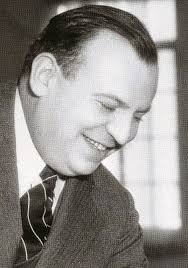
Alexander Dubin was an American lyricist. He is best known for his collaborations with the composer Harry Warren.

The Singing Fool is a 1928 American sound part-talkie musical drama motion picture directed by Lloyd Bacon which was released by Warner Bros. In addition to sequences with audible dialogue or talking sequences, the film features a synchronized musical score and sound effects along with English intertitles. The soundtrack was recorded using the Vitaphone sound-on-disc system. The film stars Al Jolson and is a follow-up to his previous film, The Jazz Singer. It is credited with helping to cement the popularity of American films of both sound and the musical genre. The film entered the public domain on January 1, 2024.
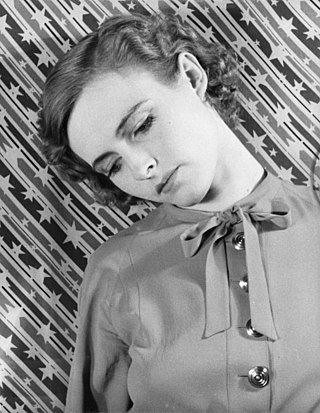
Lois Moran was an American film and stage actress.
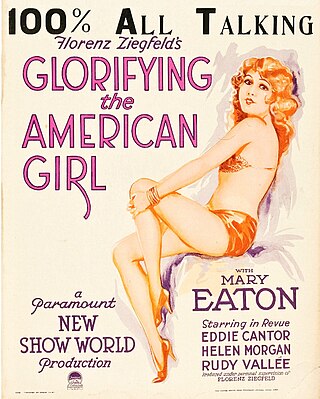
Glorifying the American Girl is a 1929 American pre-Code musical comedy film produced by Florenz Ziegfeld that highlights Ziegfeld Follies performers. The last third of the film, which was filmed in early Technicolor, is basically a Follies production, with appearances by Rudy Vallee, Helen Morgan, and Eddie Cantor.

Orchestra Wives is a 1942 American musical film by 20th Century Fox starring Ann Rutherford, George Montgomery, and Glenn Miller. The film was the second film to feature The Glenn Miller Orchestra, and is notable among the many swing era musicals because its plot is more serious and realistic than the insubstantial storylines that were typical of the genre. The movie was re-released in 1954 by 20th Century Fox to tie-in with the biopic The Glenn Miller Story.
Phonofilm is an optical sound-on-film system developed by inventors Lee de Forest and Theodore Case in the early 1920s.

Hollywood Party, also known under its working title of The Hollywood Revue of 1933 and Star Spangled Banquet, is a 1934 American pre-Code musical film starring Laurel and Hardy, The Three Stooges, Jimmy Durante, Lupe Vélez and Mickey Mouse. It was distributed by Metro-Goldwyn-Mayer. Each sequence featured a different star with a separate scriptwriter and director assigned.

Mammy (1930) is an American pre-Code musical drama film with Technicolor sequences, released by Warner Bros. The film starred Al Jolson and was a follow-up to his previous film, Say It with Songs (1929). Mammy became Al Jolson's fourth feature, following earlier screen efforts as The Jazz Singer (1927), The Singing Fool (1928) and Say It with Songs (1929). The film relives Jolson's early years as a minstrel man. The songs were written by Irving Berlin, who is also credited with the original story titled Mr. Bones.

John Altman is an English film composer, music arranger, orchestrator and conductor.

Behind That Curtain is a 1929 American Pre-Code mystery film directed by Irving Cummings and starring Warner Baxter, Lois Moran and Gilbert Emery. It was the first Charlie Chan film to be made at Fox Studios. It was based on the 1928 novel of the same name. Charlie Chan, who is played by Korean-American actor E. L. Park, gets one mention early in the film, then makes a few momentary appearances after 75 minutes. Producer William Fox chose this film to open the palatial Fox Theatre in San Francisco on June 28, 1929. It was a sound film.
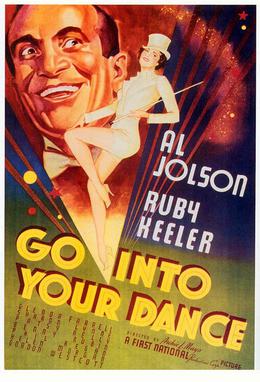
Go into Your Dance is a 1935 American musical drama film starring Al Jolson, Ruby Keeler, and Glenda Farrell. The film was directed by Archie Mayo and is based on the novel of the same name by Bradford Ropes. It was released by Warner Bros. on April 20, 1935. An irresponsible Broadway star gets mixed up with gambling and gangsters.
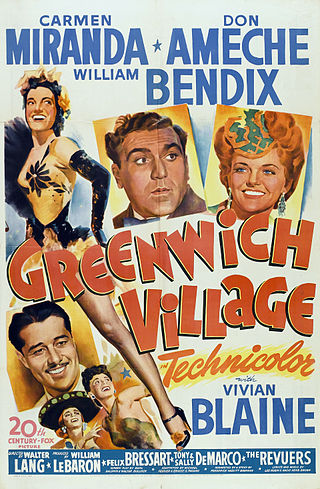
Greenwich Village is a 1944 American comedy-drama musical film from Twentieth Century Fox directed by Walter Lang. It stars Carmen Miranda and Don Ameche.

Spring Is Here is a 1930 American Pre-Code musical comedy film produced by First National Pictures and distributed by Warner Bros. It was adapted by James A. Starr from the 1929 musical play, of the same name, by Owen Davis, with music by Richard Rodgers and Lorenz Hart. The film stars Lawrence Gray, Alexander Gray, and Bernice Claire.

Lita Chevret was an American actress who began her career at the genesis of sound films. She appeared in over 60 films between 1929 and 1940, although in most of those she had small or non-billed parts.
Tom Patricola was an American actor, comic and dancer who starred in vaudeville and motion pictures. Born in New Orleans, Patricola established his fame as a hoofer, becoming a leading interpreter of the Black Bottom dance.

True Heaven is a 1929 American sound drama film directed by James Tinling, written by Malcolm Stuart Boylan and Dwight Cummins, and starring George O'Brien, Lois Moran, Phillips Smalley, Oscar Apfel, Duke Martin, and André Cheron. While the film has no audible dialog, it was released with a synchronized musical score with sound effects using both the sound-on-disc and sound-on-film process. It was released on February 17, 1929, by Fox Film Corporation.
Joy Street is a 1929 American sound film directed by Raymond Cannon and starring Lois Moran, Nick Stuart and Rex Bell. Ihe film was produced by the Fox Film Corporation. The sound was recorded using the Movietone recording system. While the film has no audible dialog, it was released with a synchronized musical score with sound effects using both the sound-on-disc and sound-on-film process.
Making the Grade is a 1929 sound part-talkie American Pre-Code comedy film directed by Alfred E. Green. In addition to sequences with audible dialogue or talking sequences, the film features a synchronized musical score and sound effects along with English intertitles. The soundtrack was recorded using the Movietone sound-on-film system. The film stars Lois Moran, Edmund Lowe and Lucien Littlefield.

Blindfold is a 1928 American synchronized sound drama film directed by Charles Klein and written by Ewart Adamson, Robert Horwood and William Kernell. While the film has no audible dialog, it was released with a synchronized musical score with sound effects using the sound-on-film movietone process. The film stars Lois Moran, George O'Brien, Maria Alba, Earle Foxe, Don Terry and Fritz Feld. The film was released on December 9, 1928, by Fox Film Corporation. It was based on a story by Charles Francis Coe.
References
- ↑ Bradley, Edwin M. (1996). The First Hollywood Musicals: A Critical Filmography of 171 Features, 1927-1932. Jefferson, North Carolina: McFarland Press. pp. 151–153. ISBN 978-0899509457.